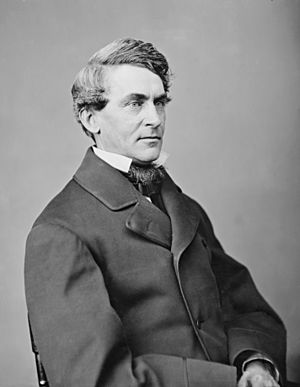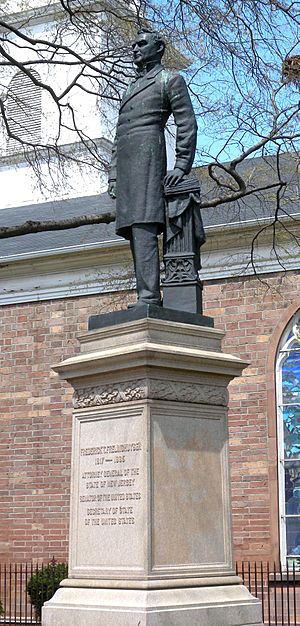Frederick T. Frelinghuysen facts for kids
Quick facts for kids
Frederick T. Frelinghuysen
|
|
|---|---|
 |
|
| 29th United States Secretary of State | |
| In office December 19, 1881 – March 6, 1885 |
|
| President | Chester A. Arthur |
| Preceded by | James G. Blaine |
| Succeeded by | Thomas F. Bayard |
| United States Senator from New Jersey |
|
| In office March 4, 1871 – March 3, 1877 |
|
| Preceded by | Alexander G. Cattell |
| Succeeded by | John R. McPherson |
| In office November 12, 1866 – March 3, 1869 |
|
| Preceded by | William Wright |
| Succeeded by | John P. Stockton |
| 22nd Attorney General of New Jersey | |
| In office 1861–1867 |
|
| Governor | Charles Smith Olden Joel Parker Marcus Lawrence Ward |
| Preceded by | William L. Dayton |
| Succeeded by | George M. Robeson |
| Personal details | |
| Born |
Frederick Theodore Frelinghuysen
August 4, 1817 Millstone, New Jersey, U.S. |
| Died | May 20, 1885 (aged 67) Newark, New Jersey, U.S. |
| Political party | Whig (Before 1860) Republican (1860–death) |
| Spouse |
Matilda Griswold
(m. 1842) |
| Children | 6, including Frederick, George |
| Relatives | Frelinghuysen family |
| Education | Rutgers University, New Brunswick (BA) |
| Signature | |
Frederick Theodore Frelinghuysen (born August 4, 1817 – died May 20, 1885) was an important American lawyer and politician from New Jersey. He served as a United States Senator and later became the United States Secretary of State under President Chester A. Arthur. He came from a family with a long history in American politics.
Contents
Early Life and Education
Frederick Frelinghuysen was born in Millstone, New Jersey. His father passed away when Frederick was only three years old. After this, his uncle, Theodore Frelinghuysen, adopted him and raised him.
Frederick's grandfather, also named Frederick Frelinghuysen, was a well-known lawyer. He helped write the first New Jersey Constitution. He also fought in the American Revolutionary War and served in the Continental Congress and the United States Senate.
His uncle, Theodore Frelinghuysen, was also a very important person. He was the Attorney General of New Jersey and a U.S. Senator. He even ran for Vice President of the United States in 1844. Later, he became the head of New York University and Rutgers University.
Frederick Frelinghuysen followed in his family's footsteps. He graduated from Rutgers University in 1836. He then studied law with his uncle in Newark. In 1839, he became a lawyer himself and took over his uncle's law practice.
Political Career and Public Service
After becoming a lawyer, Frederick Frelinghuysen worked for several large companies. These included the Central Railroad of New Jersey.
Joining the Republican Party
Frelinghuysen was first a member of the Whig Party. However, he later joined the Republican Party when it was first created. He played a key role in starting the Republican Party in New Jersey.
Service During the Civil War Era
During the American Civil War, Frelinghuysen chose to serve in public office instead of joining the army. In 1861, he was a delegate to the Peace Congress. This was a meeting held to try and prevent the Civil War. That same year, he was appointed New Jersey Attorney General and served until 1867.
In 1866, he was chosen to fill an empty seat in the United States Senate. He was elected to finish that term. However, he was not re-elected in 1869 because the other political party had more power in New Jersey.
Return to the Senate
In 1870, President Ulysses S. Grant asked Frelinghuysen to be the United States Ambassador to the United Kingdom. But Frelinghuysen turned down this important job.
From 1871 to 1877, he served again in the United States Senate. He was very active in debates and committee work. He also led the U.S. Senate Committee on Foreign Affairs. This was during talks about the "Alabama Claims," which were disagreements with Great Britain after the Civil War.
Frelinghuysen disagreed with President Andrew Johnson's plans for Reconstruction. He voted to remove President Johnson from office during his impeachment trial. Frelinghuysen supported the Radical Republicans' ideas for rebuilding the country after the war. He was known for having a clean record, even though he was part of a group of Republicans called "Stalwarts."
He was also part of a special committee that created the Electoral Commission Bill in 1877. This commission was set up to decide the winner of the very close 1876 United States presidential election. As a Republican, Frelinghuysen voted with the majority on all decisions made by the commission.
Serving as U.S. Secretary of State
On December 12, 1881, President Chester A. Arthur chose Frederick Frelinghuysen to be the United States Secretary of State. This is the top diplomat for the United States. He held this position until 1885.
When he became Secretary of State, Frelinghuysen had to deal with issues left by the previous Secretary. He preferred a peaceful and patient approach to foreign policy. He believed the United States should lead by example in the global market.
One of his actions was to withdraw the U.S. from the War of the Pacific. This was a conflict between Chile and Peru. His predecessor had supported Peru, but Frelinghuysen took a neutral stance.
He also canceled a planned meeting of American countries that his predecessor had arranged. Frelinghuysen also worked on a treaty with Hawaii. This treaty allowed the U.S. to have a naval base at Pearl Harbor. Pearl Harbor later became famous during World War II.
Frelinghuysen tried to change a treaty with Great Britain about building a canal in Central America. When that didn't work, he made a treaty with Nicaragua for a canal to be built there. However, the U.S. Senate did not approve this treaty, and it was later canceled. He also tried to make trade agreements with other countries, but these efforts were not approved by Congress.
Frelinghuysen served as Secretary of State until President Arthur's term ended in March 1885. He then retired and returned to his home in Newark. He passed away less than three months later.
Legacy and Recognition
In 1917, Frelinghuysen University in Washington D.C. was named in his honor. This was to recognize his support for African American causes.
Family Life
On January 25, 1842, Frederick Frelinghuysen married Matilda Elizabeth Griswold. She was the daughter of a wealthy merchant from New York City. Together, they had six children: three daughters and three sons.
Their children included:
- Matilda Griswold Frelinghuysen (1846–1926)
- Charlotte Louisa "Lucy" Frelinghuysen (1847–1930)
- Frederick Frelinghuysen (1848–1924), who became a businessman.
- George Griswold Frelinghuysen (1851–1936), also a businessman.
- Sarah Helen Frelinghuysen (1856–1939)
- Theodore Frelinghuysen (1860–1928)
Frederick Frelinghuysen died in Newark on May 20, 1885, at the age of 67. He was buried at Mount Pleasant Cemetery, Newark. His wife, Matilda, passed away a few years later in 1889.
Notable Descendants
Through his children, Frederick Frelinghuysen has many notable descendants. For example, his grandson Henry Cabot Lodge Jr. became a diplomat and a U.S. Senator from Massachusetts. Another grandson, John Davis Lodge, was also a diplomat, a U.S. Representative, and a Governor of Connecticut.
Images for kids
See also
 In Spanish: Frederick Theodore Frelinghuysen para niños
In Spanish: Frederick Theodore Frelinghuysen para niños
 | Emma Amos |
 | Edward Mitchell Bannister |
 | Larry D. Alexander |
 | Ernie Barnes |


